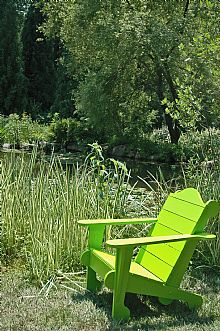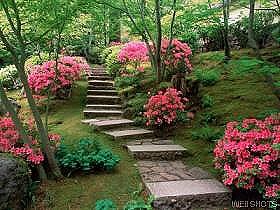|
Planning Your Feng Shui Garden
 Feng Shui is the ancient Chinese art of placement. The Chinese believe that by placing things to encourage the beneficial flow of Chi (Energy Force) you can create harmonious change which affects your health, wealth and relationships. Feng Shui is the ancient Chinese art of placement. The Chinese believe that by placing things to encourage the beneficial flow of Chi (Energy Force) you can create harmonious change which affects your health, wealth and relationships.
Feng Shui is becoming increasingly popular in the West. The Feng Shui garden incorporates Feng Shui princicples, thereby creating beneficial Chi in your environment.
A Feng Shui garden should follow nature's lead as much as possible with the primary aim of creating harmony and balance. There are certain fundamentals to remember when you begin to plan your Feng Shui garden.
Paths should never be straight, as chi energy would run too quickly towards your home, instead let them meander and curve through your garden. A curved path encourages chi to move more slowly and freely. If you already have straight paths, then allow plants to grow over them so the chi can circulate freely around them.
 A garden should have
"living spaces" that provide a haven for friends and family to relax and enjoy the sunshine and gentle
breeze. A garden should have
"living spaces" that provide a haven for friends and family to relax and enjoy the sunshine and gentle
breeze.
Trees or large shrubs will provide privacy and protection at the back of the
garden.
Balance is created by mixing different sizes, shapes and colors of plants so that no one species is overwhelmed by
another.
Water features such as pools, ponds and fountains are beautiful and encourage beneficial
chi. They also symbolize prosperity and create yin (feminine) energy.
You can create more Yang (masculine) energy by using garden lights to add light to the gardenís dark
areas. Remember balance and harmony is the key to a Feng Shui Garden.
Feng Shui Garden
Tips
1. Placing garden
lights in the Southwest area of your garden may bring about
significant and dramatic improvement in your marriage or relationship
areas of your life.
2. Plant taller trees
and fast growing shrubs in the back of your Feng Shui garden for
protection, privacy and support.
3. It is very
important to keep clutter, debris and dried leaves cleaned up. Plants
should be checked for dried or faded blooms. This will help cut down
on negative chi.
4. Always keep the
water clear and clean in any water feature you may have in your garden.
Whether itís a pool, garden pond, fountain or even a bird bath, a
healthy water feature is essential to maintain positive chi in your
Feng Shui Garden.
5. The principle of
Feng Shui are those of harmony and balance. Keeping this in mind be
careful of overwhelming the area near home with too much water. The
size of any water feature should be planned carefully and in balance
with all the elements of your garden.
6. Small courtyards
and patios can benefit from the extra beneficial chi that climbing
plants can bring into your environment.
7. Remove any tree stumps, plants or vegetation that are dead as they all create negative
chi.
8. The placement of
rocks can add the balance of yang energy to the softer, plant yin-energy.
|
